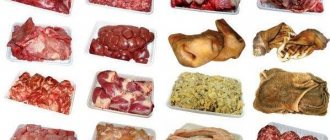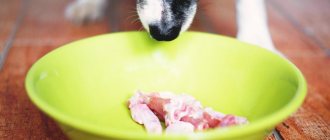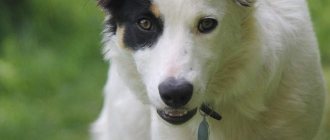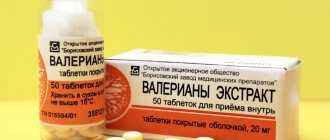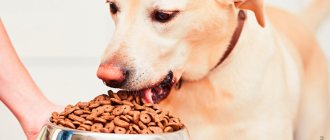Advantages and disadvantages
The antioxidants contained in pumpkin slow down the aging process and help protect your dog from liver and gall bladder diseases. Using pumpkin, you can normalize your animal's stool. It is effective as an anthelmintic.
Pumpkin contains a large amount of pectin, which fights cholesterol, flavonoids prevent the development of cancer, and very rare vitamin T speeds up metabolism.
The vegetable is so rich in useful substances that a herbal medicine, “Tykveol,” was developed on its basis, which is used in the treatment of gastritis, hepatitis and liver diseases in dogs.
Due to the large amount of fiber, pumpkin has a laxative effect. To avoid causing stomach upset in your pet, watch your portion sizes. Despite the abundance of useful substances in its composition, pumpkin should not be the basis of a dog’s diet.
What harm can seeds cause to a cat?
Naturally, one seed eaten by an animal along with the husk will not cause any harm to its health. Problems can arise when eating large quantities of unpeeled seeds. The husk, accumulating in the intestines, forms a plug, which will prevent defecation and obstruction will occur. In this case, without timely veterinary care, the risk of the pet’s death is high.
In addition to obstruction, unpeeled seeds can cause the following troubles:
- gum injury, which can lead to gum inflammation;
- a cut to the mucous membrane of the throat, which in severe cases can be fatal;
- minor damage to the intestines, from which the cat may develop cancer over time.
In addition, any seeds contain a lot of fat, which can harm a cat’s health, especially if it has liver problems and high cholesterol. The large amount of phosphorus present in the product is also undesirable for animals. We should not forget that cats are predators, therefore, their gastrointestinal tract is poorly adapted to digesting plant foods, and as a result, allergies can develop.
How to give pumpkin to a dog
Pumpkin is universal for feeding dogs; it can be combined with any food. For pets who eat exclusively dry food, raw vegetables are given as a treat and reward during training. Animals love baked pumpkin because it replaces forbidden sweets.
If you prefer to feed your dog natural products, pumpkin can be included in the diet in any form. The boiled vegetable is often mixed with cereals or meat.
Porridge from pumpkin alone is rarely cooked. Typically, dog breeders prefer to combine several types of cereals so that the animal receives as many nutrients as possible.
Boil buckwheat and millet in meat broth. Add grated carrots, beets, pumpkin and small pieces of meat. Drain off the excess broth and stir the porridge.
The dish will be both nutritious and healthy. You can put any vegetables your dog likes in it.
Seeds
It is believed that with the help of pumpkin seeds you can cleanse your dog’s body of parasites if you give them to the animal in the morning an hour before meals.
To protect your pet’s teeth and stomach, you must clean the husks.
Give your dog a few a day. In unlimited quantities, pumpkin seeds can harm your pet.
Cookie
Cut the pumpkin into small pieces and pass through a meat grinder along with offal meats. Add one egg, one spoon each of honey and vegetable oil to the minced meat. Add flour last. Add it until you get a stiff dough. Roll into small balls and place in the oven.
Rules for feeding pumpkin
Some people feed pumpkin as a supplement to help keep their pet's digestive system healthy, and many cats and dogs seem to enjoy it. This is normal as long as the stool remains normal.
Basic recommendations:
- Give your pets canned or fresh pumpkin rather than pumpkin pie filling.
- You can use cooked fresh pumpkin, but it is not necessary.
- Making pumpkin “ice cubes” is a good way to keep things fresh.
- Dosage depends on the severity of the problem.
- Cats, for constipation: 1 tablespoon per serving of food.
- Cats suffering from severe constipation usually need more than pumpkin to get back to normal, but many people like pumpkin, but here it will only be an addition to the main treatment.
- Cats, for diarrhea or intestinal inflammation: 1 teaspoon per serving of food.
- Pumpkin is usually given to dogs for mild diarrhea. Dogs, 1 tablespoon/serving for large dog;
- 1-2 teaspoons for small and medium dogs.
Again, moderate or severe cases require a combination of diet, supplements, and medications. Constipation is not a common problem in dogs. If pumpkin is used to create softer, looser stools, such as in the case of a pelvic fracture or after certain surgeries, more pumpkin is usually needed, up to 4 tablespoons per large dog per meal.
Pumpkin is a safe and pleasant digestive and gastrointestinal remedy, but it is too mild to be a true medicine for sick animals. Many gastrointestinal conditions have specific fiber requirements, and pumpkin is not an ideal source of fiber for these conditions. If in doubt, call your veterinarian. Explain how long your pet has been experiencing digestive difficulties and get some helpful tips.
To whom and how much
Puppies are started on pumpkin during weaning. The boiled vegetable is passed through a fine grater and mixed with cottage cheese or porridge. Such food will not cause intestinal upset in children, but all the beneficial substances will be retained.
Introducing fresh or boiled pumpkin into the diet helps pregnant dogs avoid constipation and other digestive problems that often plague females while pregnant.
Nursing dogs can be given vegetables starting from the second week of lactation.
For adult and elderly dogs, pumpkin should make up no more than 10% of the serving and only after consultation with a veterinarian. For representatives of large breeds (for example, Laika or Labrador), the percentage of vegetables in the diet can be increased.
Pumpkin is a seasonal vegetable and is best served in the fall, when it is time to harvest. At this time, the composition of the fruits is maximally saturated with useful substances, unlike those that lie on store shelves all year round.
For breeds prone to allergies, vegetables are introduced into the diet gradually, in small portions, each time monitoring the reaction to a new product. Despite the fact that pumpkin is considered a safe product, at the slightest suspicion of an allergy, it should be permanently excluded from the dog’s menu.
Pumpkin
Pumpkin itself is very healthy for dogs; along with carrots, it is added to food as vegetables. But not everyone knows that your pet can eat pumpkin seeds, albeit a little at a time. They will be extremely beneficial:
- serve as a tasty treat. Most dogs will eat them happily, and they are a great way to reward your pet for being obedient or following commands correctly;
- contain 12 essential amino acids, proteins and fats, which are important for the growth and structure of muscle tissue. To get the daily requirement, it will be enough to eat from 30 to 50 grams. (depends on the weight of the dog);
- a valuable source of vitamins PP, which are responsible for the healthy shine of the coat and the development of all redox reactions in the body necessary to obtain energy from fats and sugars, that is, in fact, for the absorption of other food. This vitamin is rarely found in other products and in smaller quantities;
- help cleanse the stomach - relax the intestines, making stools more liquid and frequent. Improves the functioning of the gastrointestinal tract;
- help improve immunity (will be especially valuable for small breeds);
- reduce cholesterol levels;
- make bone tissue stronger.
Sunflower
Sunflower seeds are another type of healthy treat that is loved by all dogs. It is curious that even large breeds, such as the Alabai or the Rottweiler, readily eat them, for which they are literally “one tooth at a time.”
- rich in vitamins - A, D, E, B, micro and macroelements: calcium, iron, zinc, magnesium, manganese, selenium. They have a beneficial effect on the dog’s skeletal system, strengthening it and improving mineralization. They also normalize the production of hormones, red blood cells and enzymes. Separately, it is worth mentioning the presence of vitamin E - it works as a powerful antioxidant against free radicals;
- increases the dog’s activity, so it can serve as a reward during training;
- supports the health of the cardiovascular system, strengthens blood vessels and arteries;
- reduces the level of cholesterol absorption due to the content of phytosterols.
In addition, most dog owners testify that eating the seeds calms their pets. It is quite possible that animals like not only the taste of the treat, but also the process of chewing it, as well as the crunching sound.
Is it harmful to give?
Everything is good in moderation - in relation to seeds, this maxim is more accurate than ever, since it is very easy to overfeed an animal with them.
Pumpkins in large quantities can cause digestive problems. If such an incident occurs once, the result will be an upset stomach (it is quite possible that the dog will defecate undigested seeds until they are all expelled).
If you overfeed pumpkin seeds on a regular basis, an ulcer may develop.
Sunflowers are also difficult to digest in large quantities.
Another danger of feeding dogs seeds concerns environmental issues. The fact is that this product extremely easily accumulates harmful substances - nitrates and pure poisons.
In addition, sunflower fields are usually planted near highways, where the percentage of air pollution is much higher. Therefore, it is extremely important to wash and peel purchased seeds, and the best option would be to offer the dog a product grown independently or purchased in the private sector.
Overfeeding
If, on the contrary, your pet really liked the fruit, then do not leave it within reach. In the practice of veterinarians, it is not uncommon for a dog to eat a melon and come to the appointment with acute bloating or volvulus. Breeds such as the Basset Hound are especially prone to this.
Even if the animal does not have digestive problems, overeating melon leads to a laxative effect and excessive urination. In apartment conditions, this can lead to unpleasant consequences for the animal and its owner.
Do they help against worms?
Pumpkin seeds are considered an effective folk remedy for worms; it can also be used for dogs. Pumpkin seeds contain an acid called cucurbitin - it is poisonous to worms and other parasites, but safe for humans and animals.
In order for pumpkin seeds to have an anthelmintic effect, you need to follow a number of rules:
- give them to your pet on an empty stomach;
- give in a course of 70 g per day (the amount can be reduced to 20-30 g if the dog is small).
It’s worth knowing: there is an effective recipe against worms: pumpkin seeds, dry wormwood and tansy. This powder can be mixed into the animal’s food, for example, porridge or finely chopped meat. The mixture will not only rid the dog of worms, but will also improve the condition of the coat - it will become shiny and smooth.
For puppies
The seeds can be given to both adult dogs and puppies (of course, at the age when the baby begins to eat other foods besides milk). It is correct to accustom the animal to different delicacies from childhood, otherwise the pet may not appreciate the gastronomic variety.
At the same time, the serving size should be 2 times smaller than that of an adult, otherwise stomach upset cannot be avoided. It is also important to ensure that the puppy does not choke on small grains.
If eaten with the husk
How can you tell what you've stolen?
It is possible that a pet will eat the seeds without waiting for them to be cleaned. In this case, there is no need to panic: if such a feast is not repeated regularly, it will not harm the dog.
It will be possible to understand that the dog has eaten seeds with skins after he defecates: the product will come out undigested. If there were a lot of them, the animal will begin to eat only seeds until all of them are eliminated from the body. It is also possible that the stool may turn black.
What to do?
In this case, no special help is required: the product will be eliminated from the body on its own. You should not skip feedings: they will only promote hatching.
If you have eaten a lot of seeds, you should give Vaseline oil: it coats the intestinal walls and helps relieve pain. Rough foods high in fiber (such as grated carrots and apples) are also helpful.
How to wean them off if she loves them?
It is difficult to wean a dog from eating seeds - this is a favorite treat for many animals. You can prevent incidents of theft and ingestion of too many seeds by only removing the product from the dog’s reach and dispensing it “legally” in small doses.
It is also worth offering the animal other treats: special dog biscuits, hard unsalted cheese, apples. This is more useful and safe than a large dose of seeds, and will allow the dog to “switch” and stop begging for goodies.
Read this if you don’t know if your dog can eat seeds. Helpful information!
Is it worth diversifying a dog's diet with different foods that their owners eat? Disputes about this do not subside: some believe that this animal is a predator and should not eat anything other than meat.
Others argue that you can’t do without plant proteins, fiber and carbohydrates. The pets themselves are often in a hurry to feast on everything that has not been cleared from the table. Is it worth giving dogs seeds, and what benefits it can bring, we’ll look into this article.
Pumpkin
Pumpkin itself is very healthy for dogs; along with carrots, it is added to food as vegetables. But not everyone knows that your pet can eat pumpkin seeds, albeit a little at a time. They will be extremely beneficial:
- serve as a tasty treat. Most dogs will eat them happily, and they are a great way to reward your pet for being obedient or following commands correctly;
- contain 12 essential amino acids, proteins and fats, which are important for the growth and structure of muscle tissue. To get the daily requirement, it will be enough to eat from 30 to 50 grams. (depends on the weight of the dog);
- a valuable source of vitamins PP, which are responsible for the healthy shine of the coat and the development of all redox reactions in the body necessary to obtain energy from fats and sugars, that is, in fact, for the absorption of other food. This vitamin is rarely found in other products and in smaller quantities;
- help cleanse the stomach - relax the intestines, making stools more liquid and frequent. Improves the functioning of the gastrointestinal tract;
- help improve immunity (will be especially valuable for small breeds);
- reduce cholesterol levels;
- make bone tissue stronger.
Pumpkin seeds also have an anthelmintic effect, which we will discuss in more detail below.
Is it harmful to give?
Everything is good in moderation - in relation to seeds, this maxim is more accurate than ever, since it is very easy to overfeed an animal with them.
Pumpkins in large quantities can cause digestive problems. If such an incident occurs once, the result will be an upset stomach (it is quite possible that the dog will defecate undigested seeds until they are all expelled).
If you overfeed pumpkin seeds on a regular basis, an ulcer may develop.
Sunflowers are also difficult to digest in large quantities.
In addition, they pose a risk of obesity: they are a very high-calorie product.
For dogs, obesity, especially internal obesity, when fat accumulates on the internal organs, is extremely dangerous and is fraught with a number of health problems.
Another danger of feeding dogs seeds concerns environmental issues. The fact is that this product extremely easily accumulates harmful substances - nitrates and pure poisons.
In addition, sunflower fields are usually planted near highways, where the percentage of air pollution is much higher. Therefore, it is extremely important to wash and peel purchased seeds, and the best option would be to offer the dog a product grown independently or purchased in the private sector.
Do they help against worms?
Pumpkin seeds are considered an effective folk remedy for worms; it can also be used for dogs. Pumpkin seeds contain an acid called cucurbitin - it is poisonous to worms and other parasites, but safe for humans and animals.
In order for pumpkin seeds to have an anthelmintic effect, you need to follow a number of rules:
- give them to your pet on an empty stomach;
- give in a course of 70 g per day (the amount can be reduced to 20-30 g if the dog is small).
It’s worth knowing: there is an effective recipe against worms: pumpkin seeds, dry wormwood and tansy. This powder can be mixed into the animal’s food, for example, porridge or finely chopped meat. The mixture will not only rid the dog of worms, but will also improve the condition of the coat - it will become shiny and smooth.
Peeled or peeled?
In order to pamper your pet with seeds, you will need to peel them. The animal cannot do this on its own, and the husk is unnecessary garbage that clogs the esophagus and causes intestinal problems.
In addition, unpeeled grains can get stuck between a dog’s teeth, damage the enamel and cause various problems.
Fried
Roasted seeds are not recommended for animals: after frying, there are practically no useful substances left in them for which they are given. In addition, fried food is generally contraindicated for dogs: it harms the liver and gastrointestinal tract.
It is strictly forbidden to give salty ones, this will negatively affect the gastric mucosa and the cardiovascular system. Also, seeds with aromatic additives should not be included in the animal’s diet.
For puppies
The seeds can be given to both adult dogs and puppies (of course, at the age when the baby begins to eat other foods besides milk). It is correct to accustom the animal to different delicacies from childhood, otherwise the pet may not appreciate the gastronomic variety.
At the same time, the serving size should be 2 times smaller than that of an adult, otherwise stomach upset cannot be avoided. It is also important to ensure that the puppy does not choke on small grains.
Pregnant and lactating
If a bitch eats seeds with pleasure, then there is no need to limit her treat during pregnancy and lactation. This will not cause any harm to the offspring. The only thing is that you should not overfeed the animal with high-calorie seeds, since obesity will complicate childbirth.
Breed exceptions
All breeds of dogs can eat the seeds, including small and sickly ones, like the toy terrier or chihuahua. Only the size of the portion allowed at a time will differ.
How can you tell what you've stolen?
It is possible that a pet will eat the seeds without waiting for them to be cleaned. In this case, there is no need to panic: if such a feast is not repeated regularly, it will not harm the dog.
There will be no signs of illness: the animal simply will not eat as many seeds as it takes to get sick. It is also impossible to get poisoned by seeds, both pumpkin and sunflower.
It will be possible to understand that the dog has eaten seeds with skins after he defecates: the product will come out undigested. If there were a lot of them, the animal will begin to eat only seeds until all of them are eliminated from the body.
It is also possible that the stool may turn black.
What to do?
In this case, no special help is required: the product will be eliminated from the body on its own. You should not skip feedings: they will only promote hatching.
If you have eaten a lot of seeds, you should give Vaseline oil: it coats the intestinal walls and helps relieve pain. Rough foods high in fiber (such as grated carrots and apples) are also helpful.
How to wean them off if she loves them?
It is difficult to wean a dog from eating seeds - this is a favorite treat for many animals. You can prevent incidents of theft and ingestion of too many seeds by only removing the product from the dog’s reach and dispensing it “legally” in small doses.
It is also worth offering the animal other treats: special dog biscuits, hard unsalted cheese, apples. This is more useful and safe than a large dose of seeds, and will allow the dog to “switch” and stop begging for goodies.
Conclusion
So, spending an evening with your dog eating seeds is quite possible.
The most important thing is not to get carried away and not to overfeed the animal, and also to ensure that the seeds are peeled, not fried or salted, and, if possible, from an ecologically clean region. In this case, such a somewhat unusual treat will bring your pet exceptional pleasure!
Source: https://puppy.plus/uhod/pitanie/chem-kormit/semechki-sobake.html
Can dogs have pumpkin and sunflower seeds?
Since this product is really very healthy and contains a lot of plant proteins and essential amino acids, you can offer it to your pets . The main thing that the owner must understand is that seeds, be they pumpkin or sunflower, cannot become a complete food for the dog, so they cannot replace lunch or dinner. As a treat, they are ideal for pets, the main thing is to peel them, since this is garbage they don’t need, which ends up leaving their body anyway.
Is it possible to give seeds to a dog (pumpkin, sunflower, with or without peel)
Most owners try to make their dogs’ diet as rich and varied as possible. It is a known fact that one animal protein in a pet’s diet is not enough to fully provide it with vitamins, minerals and trace elements.
In order for the animal to remain active, it is important that its diet includes plant foods. Both pumpkin and sunflower seeds contain a lot of protein and fat, and they also contain many nutrients that are essential for health. Is it possible to offer seeds to dogs?
Harm of pumpkin seeds for dogs
If you give the product to dogs in a limited manner, they cannot cause any harm. It is important to know that a large amount of pumpkin seeds can cause digestive problems; in the worst case, the product can cause peptic ulcers. If you don't clean the seeds for dogs, your dog's tooth enamel can be seriously damaged, and the seed skins can get stuck in the teeth, causing tooth decay.
Pumpkin seeds - benefits for dogs
The main benefit that pets receive from eating seeds is that along with this tasty treat, they also receive 12 essential amino acids , without which the growth and development of muscle tissue in dogs is impossible. In order to get their daily requirement, it is enough to eat about 30 - 50 g per day, and since in addition to them, pets also eat meat and other protein products, it turns out that they get everything they need from food.
In addition to amino acids, pumpkin seeds contain large quantities of vitamins PP, which is extremely rare in other products, as well as manganese. As a result, it is worth noting that pumpkin seeds significantly increase immunity, reduce cholesterol levels, which can lead to blockage of blood vessels, and also take care of bone tissue, making it stronger.
Is it possible for a toy terrier
Banana
You can and should give bananas to your pet.
The fruit is rich in important microelements (copper, potassium, sodium), vitamins (C and B6), amino acids, carbohydrates and antioxidants for the growth and development of the dog, improving its mood and appearance. It is important to give bananas starting from puppyhood to improve the pet’s immunity.
Do not give excessive amounts of fruit . A few pieces at a time are enough, about one and a half bananas per week.
Persimmon
Persimmon is a delicacy for many animals, but it is better not to give it to small toy terriers, as it causes stomach upset. The pet's fragile digestive system is not able to cope with the fiber-rich fruit.
Moreover, it may contain chemicals used to increase shelf life..
Cheese
This product is not typical for the diet of animals in the wild. However, pets are not averse to eating a piece of cheese. Cheese can be given to toy terriers in limited quantities.
The size should not exceed a small cube of 2-3 cm . By giving more, you risk developing liver diseases in your baby, since the product has a high fat content.
Grape
Eating grapes and raisins is prohibited for Toy Terriers . This fruit can even lead to the death of a dog. After eating grapes, animals experience vomiting, diarrhea, and kidney failure.
Raw meat
Raw meat can be used to feed a toy terrier, but it is better to first cut it into portions and put it in the freezer . This will get rid of bacteria.
Before serving, it is recommended to pour boiling water over it or boil it in boiling water for 2-3 minutes.
Nuts
If your pet does not have an allergic reaction, small amounts of nuts are allowed as treats. However, excessive consumption can cause problems with the liver and intestines.
Cottage cheese
Cottage cheese must be included in a dog's diet every day . Being a source of calcium, the product is indispensable for small and fragile toy terriers, and especially for pregnant and lactating bitches. The recommended dose is 2-3 tablespoons per day. It is better to choose a product with a low fat content.
Bread
White bread, like cookies and pasta, are prohibited for toy . High carbohydrate content causes intestinal problems, bloating and constipation.
Another undesirable consequence of their use is increased weight gain. You can offer your pet pieces of dried black bread.
Bones
It is strictly forbidden to give bones to toy terriers . Small fragments of bones swallowed by a pet can injure the esophagus and stomach walls and even lead to surgery.
Sunflower seeds: benefits
Free radicals cause enormous harm to the body, destroying its cells; the strongest antioxidant, vitamin E . The benefits of seeds for dogs also include the fact that they support the health of the cardiovascular system, strengthening arteries and blood vessels. Phytosterols contained in seeds reduce cholesterol levels in the blood by helping to reduce its absorption.
To ensure that the skeletal system of dogs is always strong, it is recommended to add sunflower seeds to their diet, since the selenium, magnesium, manganese, calcium, iron and zinc they contain promote mineralization processes in it. These same trace elements are involved in the production of red blood cells, enzymes and hormones. Thanks to the magnesium content in sunflower seeds, the dog remains active for a long time. Damage to sunflower seeds
The harm of seeds to dogs also concerns such issues as ecology. As you know, sunflower fields mostly grow near highways, where the air is very polluted. Since plants absorb all harmful substances, it turns out that formaldehydes, nitrates and other poisons are concentrated in the seeds, which have a toxic effect on the body. Manufacturers do not clean or wash them before packaging them, just like owners do before giving them to their pets. Like pumpkin seeds, sunflower seeds damage tooth enamel, which is very undesirable.
Thus, pumpkin seeds and sunflower seeds can be a pleasant addition to a dog’s lunch or dinner, the main thing is to give them in small quantities, since they are difficult to digest and contain a lot of fat.
What is the benefit
Having decided whether or not to give roasted or raw seeds to an animal, it is better to familiarize yourself with the recommendations for safe consumption and the benefits of what is planned.
For cats
Cats love sunflower or pumpkin kernels, although they affect the body differently. Veterinarians recommend combining both types of seeds and giving the mixture to the animal in small quantities. The general benefits of seeds for cats are presented as follows:
- Eating seeds enriches the cat with vitamins and microelements, which have a positive effect on its health.
- The fatty acids contained in the composition make the animal's coat shiny and thick. Muscle tone gradually increases - this has a beneficial effect on the functioning of internal organs.
- Vitamins make the cat more active and playful. The immune system is strengthened, which makes the pet less sick.
- The fruits contribute to the timely removal of worms, waste and toxins.
It is important! Cats, like parrots, are prohibited from giving roasted sunflower or pumpkin seeds. The prohibitions are explained by similar harmful factors described above.
Feeding the animal should follow the recommendations:
- The seeds must be dried before serving, after washing and peeling them.
- It is forbidden to give cats rotten or moldy kernels.
- It is better to offer crushed fruits to cats, since these animals cannot chew the kernels even in their peeled form. Since they are poorly digested in the stomach, whole seeds can cause intestinal obstruction.
- You should not give your cat more than 10 seeds at a time. At the first feeding, the amount is reduced by 2 times, and then they look at the animal’s well-being.
It is acceptable to feed your cat sunflower or pumpkin seeds no more than 3 times a week. An animal may love the product in question until it can be consumed in unlimited quantities, which is explained by a lack of trace elements and certain vitamins. In this case, it is better to give your pet special vitamin complexes than to feed large portions of seeds.
For dogs
Dogs consuming seeds are enriched with essential amino acids, vitamins and microelements. But the allowed amount is only 40-50 g per day. Toy breeds such as Yorkies and Chihuahuas should not eat seeds of any kind. Their digestive system is “delicate” and therefore requires special dietary nutrition. Fruits, raw or fried, can cause severe stomach or intestinal upset.
The benefits of pumpkin or sunflower seeds for dogs are presented as follows:
- Pumpkin seeds contain vitamins PP, manganese and other microelements. As a result of consuming peeled seeds, the dog’s immunity increases, cholesterol levels decrease, and bone tissue strengthens.
- Sunflower kernels are high in vitamin E, which is a natural antioxidant. Regular consumption of seeds has a positive effect on the removal of waste and toxins.
- Sunflower kernels contain phytosterols, which help reduce cholesterol levels in a dog’s blood, improve the functioning of the cardiovascular system, strengthening arteries and blood vessels.
You should not overfeed your dog with seeds, as this will lead to the development of complications in the animal’s condition. It is important to monitor your pet’s condition after consuming the product in question. If the dog has changed in behavior, it is better to stop feeding seeds.
For parrots
As mentioned above, parrots are prohibited from eating fried seeds. They are allowed and even recommended to eat raw sunflower kernels. Thanks to their composition, they help digest food and remove waste and toxins.
Vitamin E in this case helps maintain the healthy state of the mucous membranes of parrots and has a positive effect on the skin. These pets are at increased risk of developing pathologies of the skin of their paws, so it is important to give them complexes of vitamins and minerals in a timely manner. This can be done specifically when feeding the parrot with its usual foods. You are allowed to choose special food that contains sunflower seeds and particles of pumpkin kernels in small quantities.
There are special foods divided into products according to the type of parrot - budgerigar or cockatiel must eat distinctive food. If you look at special foods, you will notice that a pet receives no more than 2-3 seeds per feeding. This is the permitted dosage, from which it is prohibited to depart.

